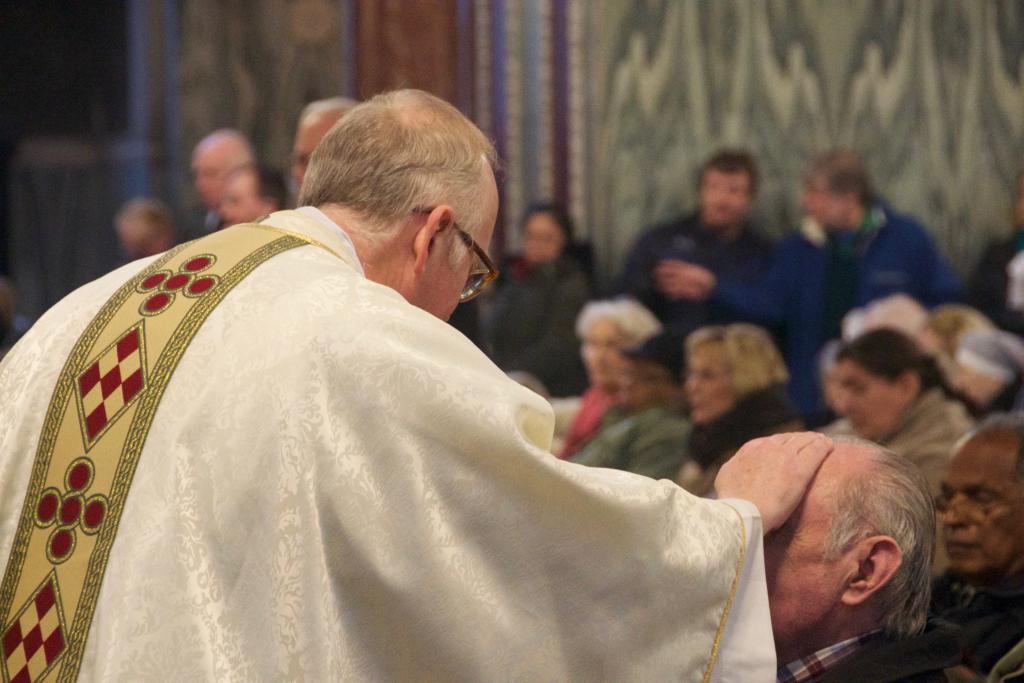By Fr Peter Harries OP
On Saturday 11th February Westminster Cathedral was packed for the celebration of Mass in honour of Our Lady of Lourdes. We sang the praises of the Immaculate Virgin Mary, and asked for her help in our lives. Many people present were infirm or had various life-limiting conditions. The sick were at the heart of the prayers of people gathered from all over the diocese, just as they are the focus of so many pilgrimages to Lourdes itself.
During the ceremony many people, those who were visibly frail and as well as those with unseen ailments, received the Sacrament of the Anointing of the Sick. The Cardinal with Bishop Paul McAleenan and several priests, including some who are chaplains to the hospitals in this diocese, moved among the crowds, laying hands on them and anointing them with oil. Later during the Mass together we received Holy Communion, the greatest medicine for immortality (Catechism of the Catholic Church, quoting St Ignatius of Antioch).
Some people think that the Sacrament of the Anointing of the Sick is only for those who are dying, as part of ‘last rites’. This is not the understanding of the Church. The Church invites any of the faithful (except babies and infants) who begin to be seriously ill or face a life-limiting condition to receive God’s grace through this sacrament. This life-limiting condition might be a psychiatric condition.
We can receive the sacrament several times in our life, particularly in the course of a prolonged illness, or following a sudden deterioration, but not frequently. If we are frail we might profitably receive the sacrament a couple of times a year, perhaps in a communal parish celebration. We should approach this sacrament before any major operation, or any stay in hospital which goes beyond a couple of days. We don’t usually receive the sacrament for minor ailments, such as colds or sprained wrists, despite the pain and short-term inconvenience of such occurrences.
The Gospels frequently recount stories of Jesus loving sick people by visiting them and healing them. For Christians today the care of the sick continues to be a priority. It is one of the great corporal works of mercy. Over the centuries the Church has built, staffed and funded many hospitals, hospices, and homes for the elderly or disabled. Today in England the state has taken over much of this responsibility, but the care of the sick remains an essential Christian priority. In addition to the care of their bodies, the care of the whole person is vital, which is why we pray for the sick often. Many parishes pray each Sunday during the bidding prayers for sick parishioners.
Sickness always troubles people and God’s faithful are no exception to this anxiety. However, Christian faith enables us to grasp something of the redemptive meaning of suffering and so face pain with courage. Our sufferings are united to the sufferings of Jesus Christ. This is not only for our own salvation, but also for the redemption of the world. Our sufferings are not then pointless, but redemptive. It can be difficult to affirm this truth of faith when the character of a loved one is stripped from them by dementia. We have to hope in the resurrection of the body and the fullness of everlasting life.
James in his epistle, part of the New Testament, wrote, ‘Are there any among you who are sick? They should call for the elders of the church and have them pray over them, anointing them with oil in the name of the Lord. The prayer of faith will save the sick, and the Lord will raise them up; and anyone who has committed sins will be forgiven.’ (Js 5.14-15) In obedience to our Lord’s will, priests (and bishops) continue to lay hands on the sick and to anoint them with oil. The priest uses a special oil, blessed by the bishop in the cathedral during Holy Week. Some parishes during the annual Maundy Thursday liturgies, publically receive this and the other blessed oils. The care of the sick, physical and spiritual, should be a constant theme of Christian life and worship.
The only members of Christ’s faithful whom we don’t anoint are babies and infants. They are baptized and we understand that they preserve their baptismal innocence, and that they have not committed sins which need forgiveness. If baptized babies are sick, we pray for them, but don’t anoint them.
But what are ‘last rites’? Last rites are the receiving of Holy Communion for the last time as viaticum. Beforehand we should make our confession and receive absolution. We should also be anointed and so enabled to die in peace, reconciled to the Lord and to the Church, God’s holy people. If someone is unconscious then they cannot receive Holy Communion obviously, but they may receive the other sacraments and we may pray the Commendation for the Dying. Last rites, including the anointing of the sick, are not for those who have died, as they can no longer benefit from receiving the sacraments. We can and should continue to pray for them, commending their souls to Almighty God.
The Sacrament of the Anointing of the Sick is an opportunity to receive God’s grace when we are sick. It is not something to be feared, rather something to be welcomed. Christ our Lord loves us, wants to accompany us, his brothers and sisters on our journey through life, and never more so, than when we are sick or in pain.
Fr Peter Harries OP is chaplain to University College Hospital




